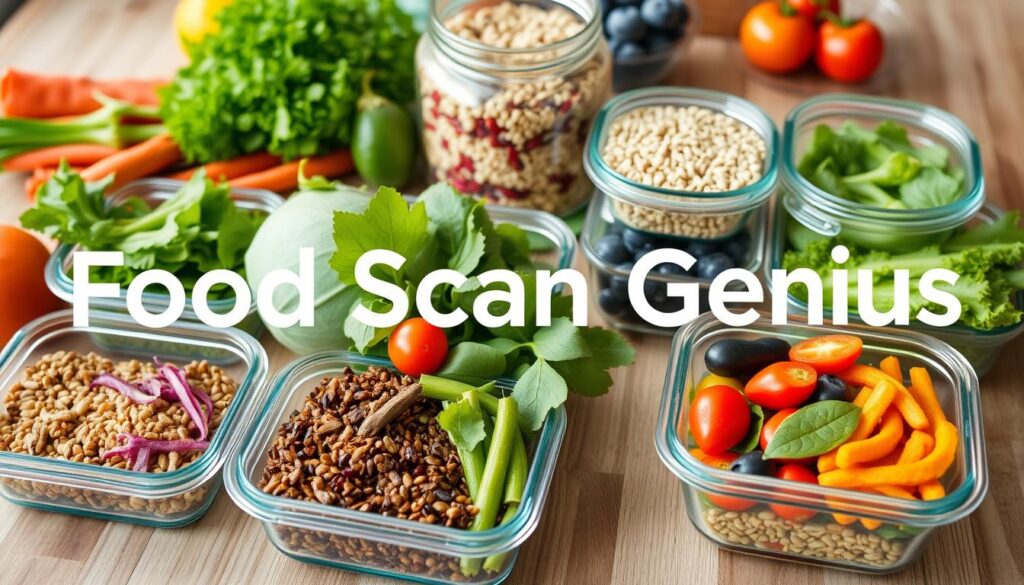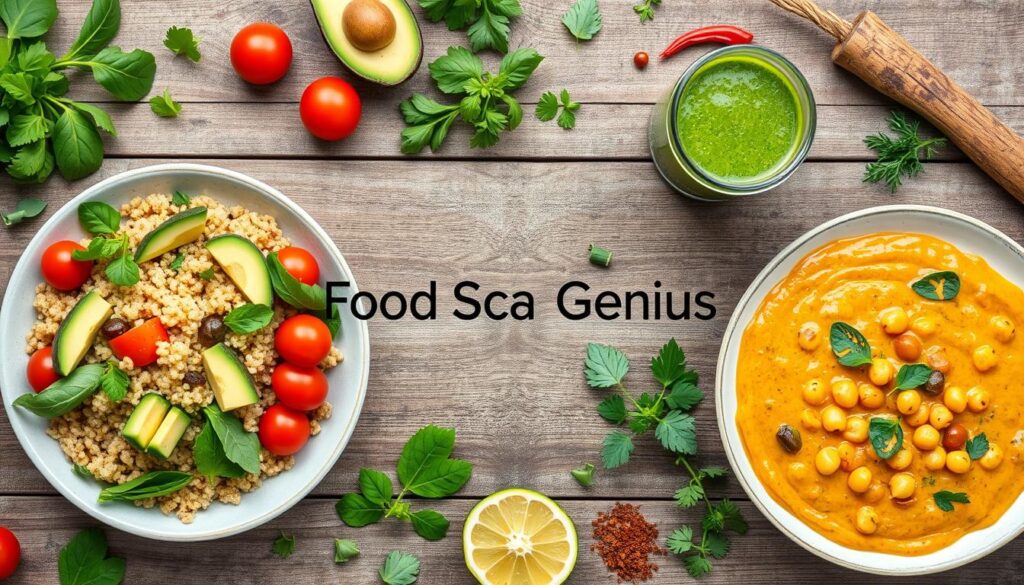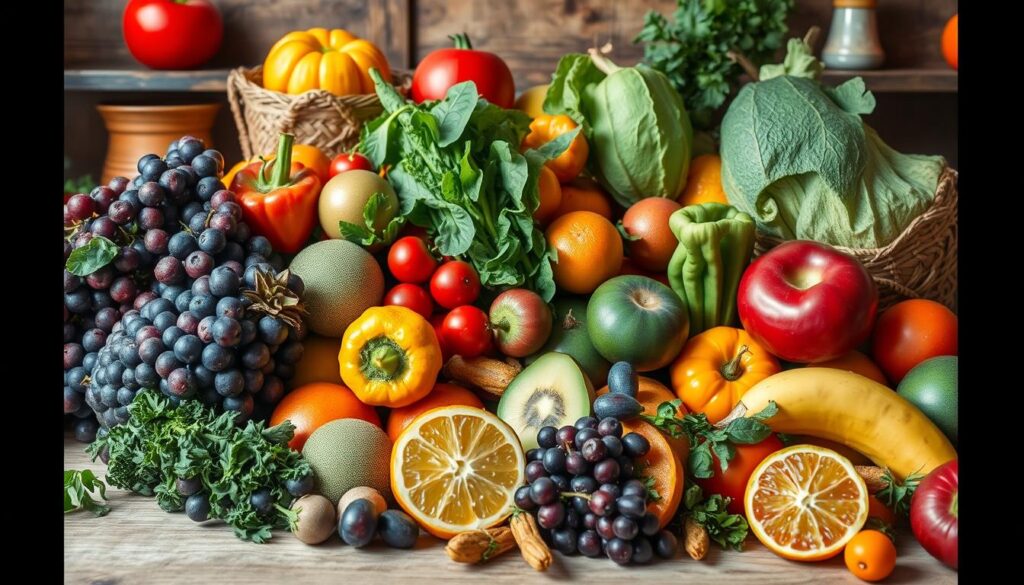Hey there, fellow food enthusiasts! 👋 We’re excited to guide you into the world of plant-based eating. This journey is perfect if you’re interested in health benefits, want to help the environment, or love trying new foods. Did you know that about one in four Americans is eating less meat? That’s a trend that’s hard to ignore!
In this guide, we’ll explore the basics of a plant-based lifestyle. We’ll talk about the health perks and debunk common myths. Most importantly, we’ll share practical tips and simple recipes to help you start eating more plants. Get ready to explore the tasty world of fruits, veggies, whole grains, and more!
Key Takeaways
- Plant-based diets are on the rise, with about one in four Americans eating less meat.
- Adopting a plant-based lifestyle can offer numerous health benefits, including weight management and reduced risk of heart disease and diabetes.
- Going plant-based can also be more environmentally friendly and potentially save you money on groceries.
- With proper planning and the right resources, transitioning to a plant-based diet can be easy and rewarding.
- This guide will equip you with the knowledge and tools to make plant-based eating a sustainable and enjoyable part of your lifestyle.
What is Plant-Based Eating?
Plant-based eating means choosing whole, natural foods from the earth. Your plate should be full of colorful fruits, crunchy veggies, and whole grains. You can also include protein-rich legumes. This way, you can eat what you like, even if it’s not always plant-based.
Defining Plant-Based Diets
A plant-based diet is all about eating foods from plants. These foods are full of fiber, vitamins, and minerals. They help keep your body healthy. Plus, you can make it your own, based on what you like and need.
Key Principles of a Plant-Based Lifestyle
- Focus on whole, natural plant foods like fruits, veggies, and whole grains.
- Try to eat less of processed and animal-based foods like meat and dairy.
- Find different plant-based proteins like tofu and beans.
- Make sure two-thirds of your plate is plant-based at every meal.
- Be flexible and let your preferences guide you.
By following these simple rules, you can start a plant-based journey. It will make you feel good, taste great, and support your health. Get ready to make your meals greener and more delicious!
Plant-based eating isn’t about deprivation – it’s about embracing the abundance of delicious, nutrient-rich whole foods nature has to offer.
Health Benefits of Plant-Based Eating
Are you ready to discover the amazing benefits of a plant-based diet? It’s not just about preventing diseases. It also supports longevity and offers many nutritional benefits. Let’s explore the science-backed advantages that will make you excited to try a plant-based diet.
Improved Heart Health
Plant-based diets are superheroes for heart health. Studies show vegetarians and vegans have lower heart disease rates. They also have lower blood pressure and cholesterol levels than meat-eaters.
By eating nutrient-rich plant foods, you can greatly reduce heart disease risks. This leads to a healthier, stronger heart.
Weight Management
Switching to a plant-based diet can help you lose weight. Research shows vegans and vegetarians lose about 1 pound per week. This is because plant foods are high in fiber and low in calories.
Plant-based eating makes it easier to keep a healthy weight. You don’t have to count calories as much.
Nutrient-Rich Foods
Choosing plants means you’re not just avoiding unhealthy foods. You’re also getting a lot of essential vitamins, minerals, and antioxidants. Vegetarians and vegans get more magnesium, potassium, iron, and folate than meat-eaters.
This nutrient-rich diet supports disease prevention and longevity. It also boosts overall well-being.
| Condition | Decreased Risk for Plant-Based Eaters |
|---|---|
| Heart Disease | Up to 42% |
| Stroke | Up to 29% |
| Obesity | Up to 50% |
| Type 2 Diabetes | Up to 78% |
| Certain Cancers | Up to 15% |
The evidence is clear. A plant-based lifestyle nourishes your body and supports long-term health. Get ready to feel the difference and experience the power of plants!
Common Myths About Plant-Based Diets
Starting a plant-based journey is rewarding, but it comes with myths. Let’s clear up some common misconceptions!
Protein Concerns
Many think plant-based diets lack protein. But, plants are full of protein like beans, lentils, tofu, and broccoli. Experts say a little meat or dairy is okay, but you can get enough protein from plants.
Food Variety Misconceptions
Some believe plant-based eating is dull and limited. But, it’s actually a world of flavors and cuisines. You can make everything from vibrant curries to hearty stews. A dietitian can help find great vegetarian recipes and websites.
Nutritional Deficiencies
It’s true that some nutrients like B12, iron, and omega-3s need more attention. But, with the right plan, you can get all you need. Fortified plant milks and cereals help a lot. Soon, you’ll be a pro at plant-based eating!
Let’s clear up these myths and enjoy the tasty world of plant-based eating. Your body and taste buds will love it!
A well-planned plant-based diet can meet all your nutritional needs. Just be mindful of B12, iron, and omega-3s.”
Getting Started with Plant-Based Eating
Starting a plant-based lifestyle is easy and tasty. You just need the right tools and recipes. Begin by stocking your pantry with whole grains, legumes, nuts, seeds, and fresh fruits and veggies. Also, get plant-based milk and nutritional yeast for that cheesy taste.
Meal Planning Tips
Meal planning is key to a successful plant-based diet. Spend some time on the weekend prepping basics like roasted veggies, grains, and proteins. This makes quick, healthy meals easy during the week.
Easy First Recipes
Ready to try plant-based cooking? We’ve got tasty, easy recipes for you. Enjoy creamy pasta dishes and hearty buddha bowls. And, Food Scan Genius can help you find plant-based options at the store.

Let’s start cooking and turn your kitchen into a plant-based haven! With the right pantry, meal planning, and recipes, you’ll master plant-based eating in no time.
How to Transition to a Plant-Based Diet
Starting a plant-based lifestyle is a journey, not a race. Some people jump in right away, while others take it slow. It’s important to find what works best for you. Remember, it’s about making progress, not being perfect.
Gradual Approach vs. Cold Turkey
For beginners, starting slow might be better. Try adding more legumes, whole grains, and starchy veggies to your diet. This can help you feel full and eat less animal products. Others prefer to stop eating meat, dairy, and eggs all at once.
Setting Realistic Goals
When setting goals, make them realistic and achievable. Start with one plant-based meal a day and increase it gradually. Focus on big changes like swapping meat for beans or trying plant-based milk.
Finding Support and Resources
Having a support system makes the transition easier. Look for online communities, follow plant-based bloggers, or find a friend who’s also making the change. We’re here to help with food choices and provide all the resources you need.
A plant-based diet is not just a diet – it’s a lifestyle change that can have profound impacts on your health, the environment, and the well-being of animals.” – [Expert Name], Plant-Based Nutrition Consultant
Plant-Based Foods to Incorporate
Explore the exciting world of plant-based eating! There’s a wide range of tasty and healthy options to try. Let’s look at some key foods that can make your plant-based diet better.
Whole Grains and Legumes
Whole grains like quinoa, brown rice, and oats are full of fiber. They help you feel full. Legumes, such as beans, lentils, and chickpeas, are packed with plant-based protein. Adding these to your meals makes them nutritious and filling.
Fruits and Vegetables
Eat a variety of fruits and vegetables to fuel your body. They’re rich in vitamins, minerals, and antioxidants. From carrots to berries, there’s a lot of flavor and texture to discover.
Nuts and Seeds
Add nuts and seeds for a crunchy texture. They’re good sources of protein and fiber, and also have healthy fats. Enjoy almonds, chia seeds, or creamy nut butters to boost your meals.
Variety is key in a vibrant plant-based lifestyle. Try different grains, legumes, fruits, and vegetables. Use tools like Food Scan Genius to find new options. This way, you can nourish your body and make your meals exciting!
A plant-based diet is not about what you can’t have, but about all the amazing, delicious, and nourishing foods you can enjoy.” – Dietitian Jane Doe
Dining Out on a Plant-Based Diet
Eating out on a plant-based diet is easier than you think. More restaurants are now vegan-friendly. Chefs are also more willing to make special dishes for you.
Navigating Menus
When you look at menus, find dishes that are already plant-based. Many places have vegan or vegetarian sections. You can also ask for changes, like avocado instead of cheese.
Asking for Modifications
Talking to the staff about your diet can make your meal better. Ask about ingredients and if they can change things to fit your diet. Restaurants usually want to make sure you’re happy.
Popular Plant-Based Restaurants
More vegan restaurants are opening everywhere. Apps like HappyCow help you find them. Try places that serve Indian, Middle Eastern, or Ethiopian food for great plant-based options.
| Restaurant | Location | Cuisine | Highlights |
|---|---|---|---|
| Casa De Luz | Austin, TX | Macrobiotic | Sugar, oil, and salt-free plant-based dishes |
| Araya’s Place | Seattle, WA | Thai | All-you-care-to-eat vegan Thai buffet |
| Veggie Grill | Multiple Locations | American | Fast-casual plant-based restaurant chain |
Dining out on a plant-based diet can be fun and tasty. Look for vegan-friendly restaurants. Try menu hacks to make your meals better. And enjoy all the plant-based options out there.
Plant-Based Meal Ideas
Starting a plant-based diet doesn’t mean you have to give up taste or enjoyment. The world of plant-based recipes is full of tasty options to start your day. Whether you’re already vegan or just starting, these nutritious plant-based dishes will make every meal exciting.
Quick Breakfast Options
Begin your day with a healthy plant-based breakfast. Try making Overnight Oats with chia seeds, berries, and nuts. Or, blend a Smoothie Bowl with greens, bananas, and granola. These quick meals will keep you energized all morning.
Satisfying Lunches
For lunch, make a Plant-Based Salad with mixed greens, roasted veggies, chickpeas, and avocado dressing. Or, fill a Veggie-Packed Wrap with your favorite ingredients for a tasty, easy meal.
Delicious Dinner Recipes
In the evening, enjoy a Lentil Shepherd’s Pie or a Vegetable Stir-Fry with spices and zucchini noodles. For a quick dinner, try a Plant-Based Pizza with a chickpea crust and your favorite toppings.
There are countless amazing plant-based recipes to try. With so many options, you can easily make easy vegan meals and nutritious plant-based dishes. Start your plant-based journey and let your taste buds explore!

Overcoming Challenges in Plant-Based Eating
Starting a plant-based lifestyle is a big step and a rewarding journey. It comes with its own set of challenges. But don’t worry, we’ve got you covered!
Dealing with Cravings
It’s normal to miss old favorite foods when you switch to plant-based. The trick is to find new, tasty options that fit your diet. Try plant-based cheese, creamy cashew butter, or vegan mayo to curb cravings. It’s not about giving up, but exploring new flavors.
Social Situations
Dealing with social events on a plant-based diet can be tough. But talking openly about your diet helps a lot. Let your friends and family know about your choice and suggest plant-based places to eat. They’ll likely be supportive.
If they’re not, speak up for yourself. Your health and values are important.
Staying Motivated
Staying motivated can be hard, but keep your reasons in mind. It might be for your health, the planet, or animals. Keep learning, trying new recipes, and celebrate your small wins.
Remember, you’re not alone. Look for online communities for support and inspiration. With the right mindset and help, you’ll master plant-based eating in no time.
FAQ
What is plant-based eating?
Plant-based eating focuses on natural foods from plants. This includes fruits, vegetables, grains, legumes, nuts, and seeds. It aims to reduce or avoid animal products like meat, dairy, and eggs.
What are the key principles of a plant-based lifestyle?
A plant-based lifestyle emphasizes whole, natural foods. It’s about eating a variety of fruits, vegetables, whole grains, and legumes. It also means less animal products and processed foods.
What are the health benefits of plant-based eating?
Plant-based diets can lower heart disease, diabetes, and cancer risks. They help with weight management, too. Plants are full of fiber, vitamins, and minerals that boost health.
What are some common myths about plant-based diets?
Some myths say plant-based diets lack protein or are boring. But, plants are great protein sources. A well-planned plant-based diet meets all nutritional needs.
How do I get started with plant-based eating?
Start by stocking up on whole grains, legumes, nuts, seeds, fruits, and vegetables. Meal planning and trying new recipes can be fun. The Food Scan Genius app helps find plant-based options.
What is the best way to transition to a plant-based diet?
Transitioning to a plant-based diet varies for everyone. Some jump in fast, others do it slowly. Set achievable goals and use resources like the Food Scan Genius app for support.
What are some of the best plant-based foods to incorporate?
Include whole grains, legumes, fruits, vegetables, and nuts in your diet. Trying different foods keeps your meals exciting and satisfying.
How can I navigate dining out on a plant-based diet?
Dining out plant-based is easier than you think. Many places offer plant-based options. Ask for customizations and explore cuisines like Indian or Middle Eastern. The Food Scan Genius app helps with menu choices.
What are some easy, plant-based meal ideas?
Try overnight oats or a smoothie bowl for breakfast. Lunch can be a bean and avocado salad or a veggie wrap. Dinner ideas include stir-fries, lentil pies, or zucchini noodles. Snacks like hummus or energy balls are also great.
How can I overcome challenges with plant-based eating?
Overcoming challenges involves finding plant-based alternatives and staying motivated. Communicate your choices in social situations and celebrate your progress. The Food Scan Genius app is a helpful tool on your journey.






1 Comment
[…] gluten-free eating needs practical knowledge and good planning. Let’s learn how to make this dietary change work for your health and […]